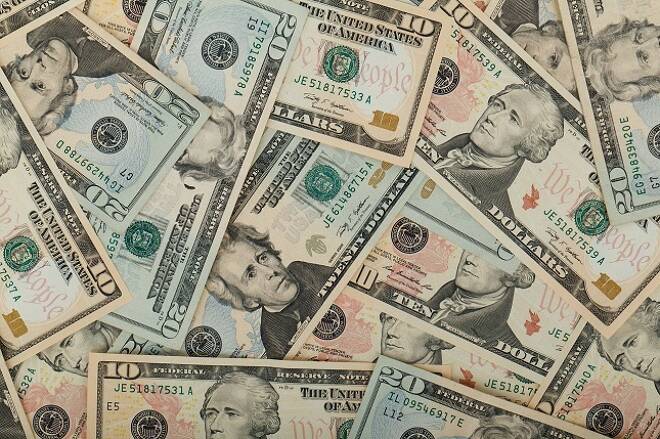Advertisement
Advertisement
EUR/USD Daily Technical Analysis for January 3, 2018
By:
End of QE Helps the Euro Gain Traction
The EUR/USD moved higher testing resistance levels, as a stronger than expected manufacturing PMI lifted yields as ECB members hinted that QE would be terminated by the end of 2018. The ECB has been very accommodative, but with inflation steady and growth picking up the Euro is on the move higher.
Technicals
The EUR/USD tested resistance near the September highs at 1.2092, but was unable to pierce through this level. A strong Euro is weighing on European stock prices, making multinationals less competitive against their peers. Support is seen near the 10-day moving average at 1.1920. Momentum is positive as the MACD (moving average convergence divergence) histogram prints in the black with an upward sloping trajectory which points to a higher exchange rate. The RSI also edged higher which reflects accelerating positive momentum, but the current reading of 71, is above the 70-overbought trigger level which could foreshadow a correction.
Eurozone Manufacturing Confirmed Higher
Eurozone manufacturing PMI confirmed at 60.6, up from 60.1 in the previous month. National results were mixed, however, with the Italian reading falling back to 57.4 from 58.3 and the French reading revised down to 58.8 from 59.3 reported initially, although this is still a 20 month high. Readings remain at record highs in Germany, Austria and Ireland and even the Greek number is now firmly above the 50 point no change mark at a 114 month high of 53.1. Markit reported that overall business optimism was a series-record high with near record increases in output and new orders as domestic market conditions remained robust while new export order numbers were only a tick below the record high recorded in November. So far then the strong EUR and Brexit has not dampened sentiment in the manufacturing sector, although both remain factors that could hit the outlook again in coming months, even if companies ended 2017 in a buoyant mood.
ECB’s Coeure hints QE to end this year
The Executive Board member said that “given what we see in the economy, I believe that there is a reasonable chance that the extension of our asset purchase program decided in October can be the last”. He added that confidence of inflation rising toward 2% over medium term “justifies a gradual and cautious recalibration of monetary policy” and that “markets have to understand that QE will not last forever”, although Coeure also repeated that the Governing Council “has also made it clear that the program can be kept in place for longer, should inflation disappoint on the downside.” So while asset purchases will continue until at last September under the new QE program, the comments confirm that the forward guidance will start to change in coming months, with the ECB very cautiously preparing for an end-date for QE.
ECB’s Mersch warns against acting too Late
In an interview with Germany’s Boersenzeitung Mersch stressed that the central bank must be careful not to fall behind the curve when starting to normalize monetary policy, even if the exit from the ECB’s ultra-accommodative policy stance has to be “cautious and gradual”. Mersch also admitted that the central bank’s negative interest rate policy risks undermining “the culture of saving” in the euro area.
UK December Manufacturing PMI Missed Expectations
UK December manufacturing PMI missed expectations, declining to a headline reading of 56.3 from 58.2 in the month prior. The median forecast had been for a more moderate dip to 57.9. The 56.3 outcome matches that seen in the October survey, unwinding what was an unexpected pop in November. Despite the slowing from November levels, the survey still indicates healthy expansion in the sector, and showed output, new orders and employment components all rising at solid, above-trend rates. The average reading for Q4 2017 worked out at 57.0, which is the best average since Q2 2014. The report also showed an abatement in input costs, which touched a four-month low rate of increase, though selling prices rose for a twentieth successive month. The outlook remains positive, with 54% of companies reporting that they expect production to rise over the coming year.
Chinese PMI Came in Stronger than Expected
The Caixin/Markit manufacturing Purchasing Managers’ Index for December came in at 51.5. Economists expected the private Caixin/Markit PMI to come in at 50.6 in December versus 50.8 in November. China reported official manufacturing PMI, as expected, at 51.6 in December, a dip from 51.8 in November.
About the Author
David Beckerauthor
David Becker focuses his attention on various consulting and portfolio management activities at Fortuity LLC, where he currently provides oversight for a multimillion-dollar portfolio consisting of commodities, debt, equities, real estate, and more.
Advertisement
